Pastor Sara lamented two weeks ago that she was saddled with the topic of suffering while I was preaching on joy and love. One of the perks of being in charge of planning worship is you get the first pick at the preaching rotation. So, given the choice between joy and love or suffering, I took the former. But because the theme of suffering is threaded through the entire letter of 1 Peter, here I am closing out the letter and my second to last sermon at Mount Olivet with a sermon on suffering. Lucky me.
Professor Miguel A. De Le Torre points out that Christians should not be surprised if we suffer because Jesus suffered. 1 Peter and much of the New Testament make clear that following Jesus leads to suffering. Leads to suffering, not can lead to suffering. For five chapters, 1 Peter tried to offer reassurance and hope to those who face or will face persecution for their commitment to following Jesus.[i]
The suffering in 1 Peter is suffering experienced by the early church living as resident aliens, the minority religion within the Roman Empire. The Roman Empire first and foremost, like any other empire, demands allegiance from its citizens. Failure to give what the empire demands results in persecution and suffering.
Following Jesus is risky business, dangerous business. Yet, when Christianity is the dominant or most influential religion in our culture, it is easy for us to forget that the declaration of Jesus as Lord over all creation is one of the most dangerous proclamations that can be made.
To preach the good of the Good News to the least, last, and lost, to proclaim that Jesus came to save scoundrels and sinners is to reject the prevailing power structures of yesterday, today, and tomorrow.
Jesus was a threat to the empire. The empire did not kill Jesus because His teachings were contrary to or poked holes in the orthodox doctrine of the day. Rome was not worried about the power structure of the Hebrew leaders of the Temple in Jerusalem. But Jesus’ life threatened the structures Rome kept in place through allegiance and power. To stand against the allegiance and power of Rome made Jesus public enemy number one.
Jesus was a threat to the empire, plain and simple. And the empire struck back.
Jesus was not killed because he reduced God’s top-ten to His own top-two – “Lord your God with all your heart, and with all your soul, and with all your mind” and “You shall love your neighbor as yourself.”[ii] And so, the first recipients of this letter were not a threat because they believed Jesus to be the Son of God or that he rose on the third day and ascended on the 40th day. The threat to the empire was their allegiance. The threat, and thus the persecution and suffering, resulted from their declaration of Jesus as Lord. And, because Jesus is Lord, Caesar is not.
When we baptize someone, like Emma last week, we baptize them because they are declaring Jesus to be Lord of their life. If following correct doctrine was a prerequisite for baptism, the water in our baptismal fount would be untouched.
Peter is telling the church – yesterday and today – that only God, not the Caesars of yesterday and today, has the capacity to protect and restore creation. Only God deserves our allegiance.
Protection and restoration always come at a cost; in the empire, that cost is paid on the backs of those who wield little or no power and influence. Economic structures benefit from workers who are often hidden in the shadows of a company’s profits. Defense structures create more and more weapons, providing a defense industrial complex with an endless economic windfall.
But it is not just the big structures of the geo-political empires that promise protection and restoration in exchange for your allegiance. Daily we choose which structures, influencers, and symbols to which we will pledge our allegiance. That pledge often comes in direct contrast to the declaration each of us makes at the waters of our baptism. The cost for these choices is side lining our allegiance to Christ, even if only for a moment before we repent and turn back to our Lord.
There was a cost for the protection and restoration of God, but it has been paid in full by Christ. The joy and hope we have in the light of the empty tomb comes because the good news we hold dear stands in contrast to the allegiance required by the empires of the world.
To say “No,” to the demands and needs of the empires of the world is no easy task because the empires of our world desperately depend on your “yes” and allegiance. And they, like the Devil tempting Jesus in the Wilderness, will offer us power and influence in exchange for our allegiance.
If Jesus is Lord of all Creation, then Dr. Stanley Hauerwas is correct in his assertion that everything else is malarky.
Everything is the empires of the world.
Everything is religiosity, the should and musts we attempt to attach to the good of the Good News of Christ’s redemption of all Creation; once for all.
Everything is anything that distracts us from God's salvific and amazing grace in Jesus Christ.
Living where we live and doing what many around here do can lead to mixed allegiances, which can lead to anxiety, fear, and more. But 1 Peter tells us that we can cast our anxiety to God. And that is where the good in the Good News resides.
Contrary to what many Hobby Lobby home décor signs want you to believe, this is more than letting go and letting God or giving it all over to God. But (and like last week’s but, it is a big but and does not lie) because Jesus left the tomb, and because he ascended, sits at the right hand of God the Father, and now reigns over all creation as Lord, we can trust that while we are being pulled in one direction or another, we are protected and are being restored to God by God.
Jesus’ lordship is not a bait-and-switch deal. The worldly thing to do to prove one’s allegiance is through pledges or other activities that build up the empires of the world. But Jesus’ lordship is not dependent on what we do; rather, Jesus is Lord because of what God has done.
In our declaration of Jesus’ Lordship over all creation, especially over our lives, we trade the pledges and activities and the symbols and traditions of the world for bread and wine, for body and blood. But at times we have a more emotional response to the pledges and activities, the symbols and traditions of the world than we do when we hear the words “You are forgiven,” “The Body and Blood of Christ given for you.” Just as we approach the waters of our baptism as we with a simple declaration of Jesus as Lord, coming to the Table imperfect and in need of grace. Our hands are open to receive bread and wine knowing that this means of Grace transforms us from the inside out.
Jesus is Lord, and everything else is...
Amen.
[i] Feasting on the Word, Year A, Vol 2. Westminster Knox Press. 2010.
[ii] Matthew 22:27-29
All artwork is by James Janknegt and used with permission.






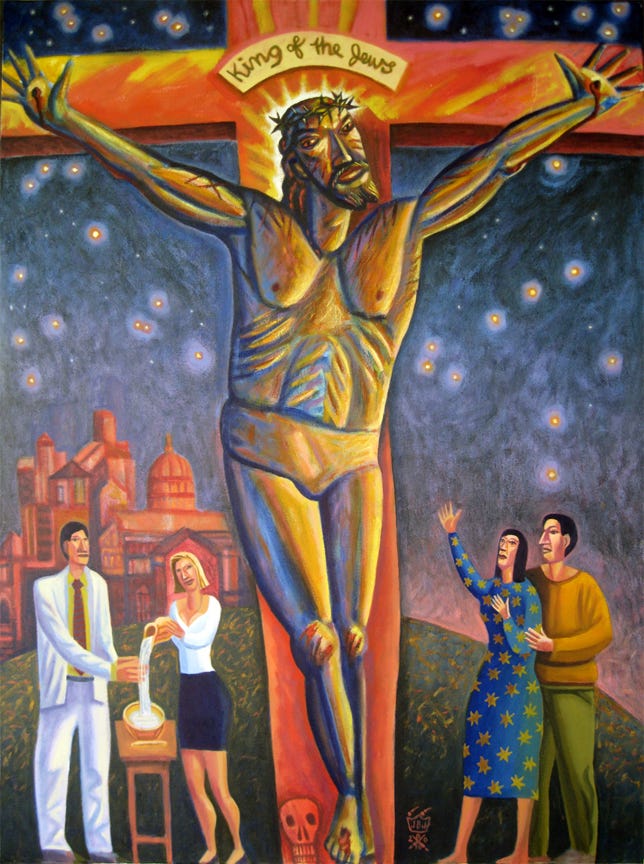
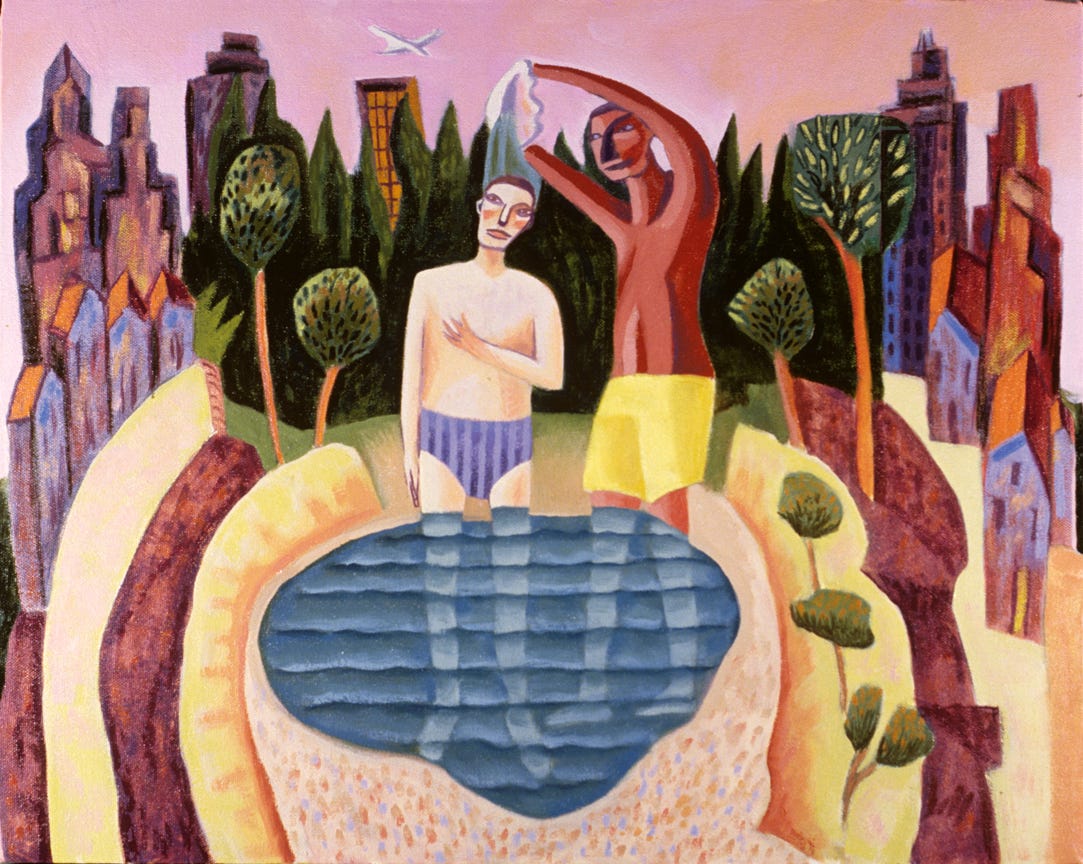
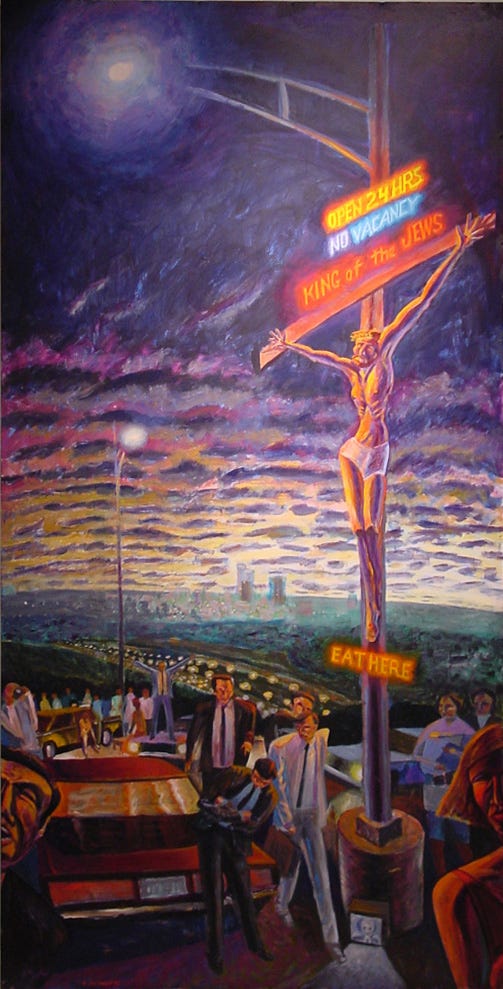

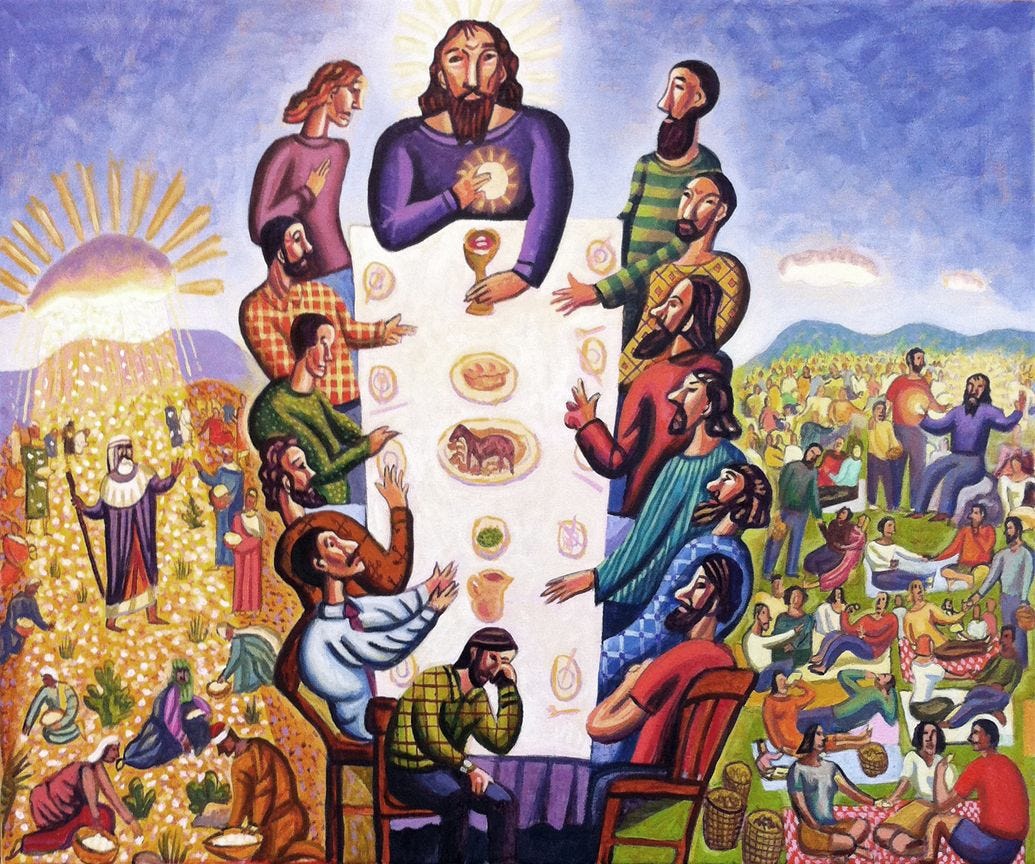








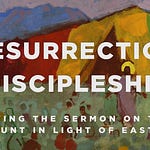
Share this post